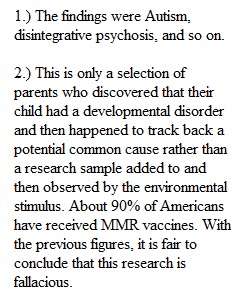


Q The information below is a summary of a scientific article related to the MMR vaccine and autism. The article was originally published by: Ileal-lymphoid-nodular hyperplasia, non-specific colitis, and pervasive developmental disorder in children.A.J. Wakefield, S.H. Murch, A. Anthony, J. Linnell, D.M. Casson, M. Malik, M. Berelowitz, A.P. Dhillon, M.A. Thomson, P. Harvey, A. Valentine, S.E. Davies, J.A. Walker-Smith. The Lancet, Volume 351, Number 9103, 28 February 1998. Background: We investigated a consecutive series of children with chronic digestive problems and regressive developmental disorder. Methods: Twelve children (mean age 6 years [range 3-10], 11 boys) were referred to a pediatric gastroenterology unit with a history of normal development followed by loss of acquired skills, including language, together with diarrhea and abdominal pain. Children underwent gastroenterological, neurological, and developmental assessment and review of developmental records. Findings: Onset of behavioral symptoms was associated, by the parents, with measles, mumps, and rubella (MMR) vaccination in eight of the twelve children. All twelve children had intestinal abnormalities. Behavioral disorders included autism (9), disintegrative psychosis (1), and possible postviral or vaccinal brain inflammation (2). Interpretation: We identified associated gastrointestinal disease and developmental regression in a group of previously normal children, which was generally associated in time with possible environmental triggers (MMR vaccine). Answer the Following Questions: 1. What is your initial reaction to reading this? 2. Do you find any flaws? 3. Thinking critically like a scientist, what types of questions should be asked and what data examined to determine if the MMR vaccine causes autism? After answering the questions, I would like you to find your own scientific article about a topic you are interested in. It could be a study about Covid-19, genetic disorders, cancer, etc. Once you have selected an article, upload a copy and use what we discussed in class to explain why the particular experiment you chose is scientifically accurate and lacking flaws in design. For example, if the experiment contained a control group, state that it did and explain how the control group was different than the experimental group(s). Include two (2) explanations pointing to great experimental design. To further help, I have attached a document that includes warning signs to look for in poorly designed experiments in order to contrast. Warning Signs in Experimental Design.pdf 37
View Related Questions